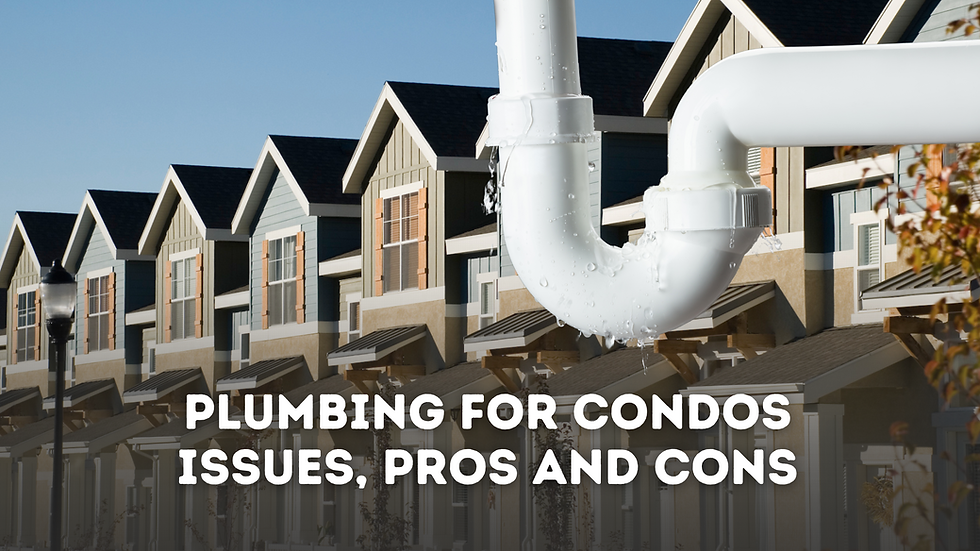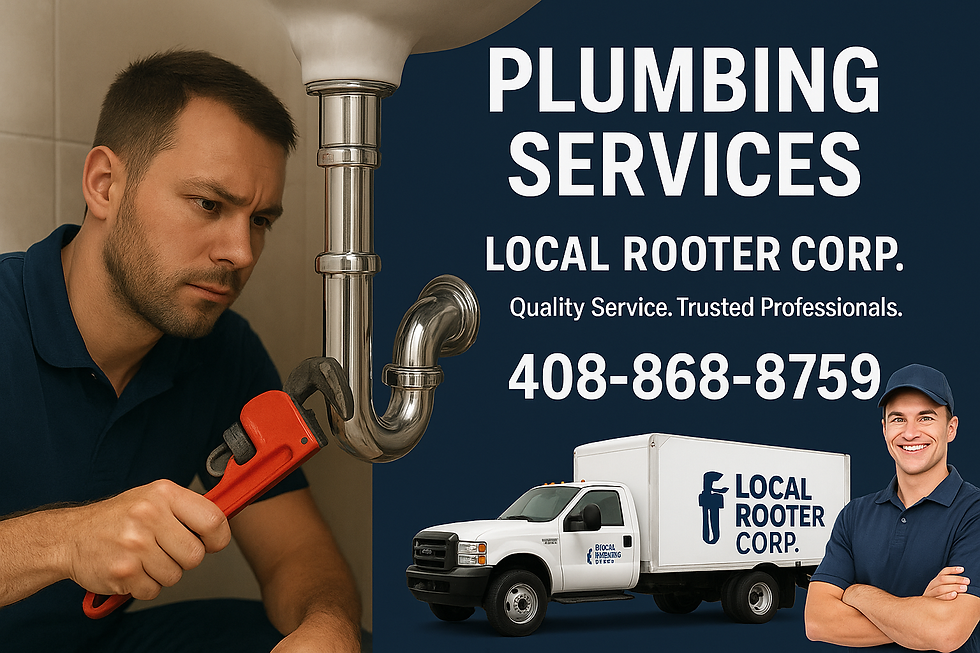Plumbing for Condos: Issues, Pros and Cons Compared to Single-Family Homes
- Local R&P

- Sep 9
- 4 min read
When it comes to plumbing, not all homes are created equal. Living in a condo offers convenience, shared amenities, and less maintenance responsibility—but it also comes with unique plumbing challenges. In contrast, single-family homes provide more independence and control, but they also carry the full weight of repairs and upkeep.
If you’re considering condo living or currently own one, understanding the plumbing systems, common issues, and differences compared to single-family homes is essential. This guide breaks down the pros and cons of condo plumbing, what homeowners need to watch out for, and how to make informed decisions about maintenance and repairs.

How Condo Plumbing Systems Work
Unlike single-family homes where the plumbing is contained within one property, condo plumbing systems are interconnected. Multiple units share main supply lines, sewer drains, and water shut-off points. Typically:
Vertical stacks (riser pipes): Supply water and carry waste up and down through each floor.
Branch lines: Deliver water from risers to each unit.
Shared drains: Multiple units often feed into the same drain system.
Common vs. private plumbing: The building association usually maintains main lines, while individual owners are responsible for unit-level pipes and fixtures.
This shared setup is efficient but can complicate responsibility when problems arise.
Common Plumbing Issues in Condos
Condo owners may face unique plumbing issues that differ from single-family homes. Some of the most frequent include:
Leaks Between UnitsWater leaks in one condo can seep into walls, ceilings, or floors of another. Determining liability (unit owner vs. HOA) can be difficult and may require legal or insurance involvement.
Clogged Shared DrainsA blockage in a vertical stack or shared drain can affect multiple units at once. One resident’s grease or debris could back up water into another unit’s sink or tub.
Water Pressure FluctuationsBecause water supply is shared, units on higher floors may experience lower water pressure, especially during peak use.
Aging InfrastructureIn older condo buildings, galvanized steel or cast iron pipes may corrode, leading to leaks or restricted flow. Upgrading entire building systems can be costly and disruptive.
Limited Access for RepairsPipes often run behind shared walls or ceilings, making repairs more complex. Gaining HOA approval for major work can delay solutions.

Pros of Condo Plumbing Compared to Single-Family Homes
Despite the challenges, condo plumbing systems offer advantages:
Shared Responsibility
Many large repairs, such as replacing riser pipes or repairing main drains, fall under the HOA’s responsibility. This can save individual owners thousands in repair costs.
Lower Maintenance Burden
Condo owners only need to maintain fixtures and unit-level piping, not the entire system. In contrast, single-family homeowners are responsible for all water, sewer, and exterior lines.
Professional Management
Condo associations often hire professional plumbers to manage ongoing maintenance, inspections, and emergency repairs.
Insurance Protection
In many cases, building insurance may cover water damage from shared system failures, reducing personal financial risk.
Cons of Condo Plumbing Compared to Single-Family Homes
However, there are downsides condo owners should be aware of:
Limited Control
You cannot independently upgrade or replace major plumbing systems in your building. You must rely on the HOA’s decisions, budget, and timelines.
Shared Risk
A neighbor’s plumbing mistake—like flushing inappropriate items or ignoring a small leak—can affect your unit.
Complex Liability
Disputes often arise over whether a repair falls under HOA or unit owner responsibility. This can delay resolution and increase stress.
Access Challenges
Unlike in a single-family home where you can open walls or replace pipes as needed, condo plumbing repairs may require HOA approval and coordination with neighbors.
Single-Family Home Plumbing: Pros and Cons
To better understand the comparison, let’s look at single-family home plumbing.
Pros:
Full Independence: You control all upgrades, maintenance, and replacement timelines.
No Shared Risk: Problems stay within your home, with no risk from neighbors.
Easier Upgrades: Adding water filters, tankless heaters, or rerouting lines can be done without HOA approval.
Cons:
All Costs on You: From main sewer line clogs to slab leaks, the homeowner bears the entire financial responsibility.
Bigger Maintenance Scope: Outdoor plumbing, irrigation, and sewer laterals are additional burdens.
Emergency Exposure: A burst pipe or sewer backup means you’re fully responsible for repairs and restoration.
Cost Comparison: Condo vs. Single-Family Plumbing
Factor | Condo | Single-Family Home |
Maintenance Responsibility | Split between HOA and owner | 100% homeowner |
Repair Costs | HOA covers major systems; owner pays for fixtures and unit lines | Homeowner covers everything |
Insurance Coverage | HOA insurance may cover shared systems | Homeowner insurance must cover all |
Upgrade Flexibility | Limited | Full control |
Risk from Neighbors | High (shared systems) | None |
Tips for Condo Owners to Avoid Plumbing Problems
Know Your HOA RulesReview condo bylaws to understand what plumbing issues are your responsibility versus the association’s.
Install Water AlarmsPlace leak detection devices near water heaters, under sinks, and behind appliances to catch issues early.
Practice Preventive MaintenanceAvoid flushing wipes, grease, or debris that could clog shared pipes.
Maintain Fixtures RegularlyReplace old hoses, shut-off valves, and supply lines inside your unit to prevent small leaks from escalating.
Build Good Neighbor RelationshipsCommunication with upstairs and downstairs neighbors can help detect leaks quickly and resolve problems cooperatively.
When to Call a Professional
Whether in a condo or single-family home, early intervention is key. Call a licensed plumber if you notice:
Persistent low water pressure
Recurring clogs affecting multiple fixtures
Water stains on ceilings or shared walls
Sudden spikes in your water bill
Aging pipes or corroded fittings
Condo owners, in particular, should contact both their HOA and a plumber immediately when issues arise.

Conclusion
Plumbing in condos is a double-edged sword: you benefit from shared responsibility and lower maintenance, but you also face shared risks and limited control. Single-family homes, on the other hand, offer independence but place the entire financial and maintenance burden on the homeowner.
By understanding the differences, issues, pros, and cons, you’ll be better equipped to handle plumbing challenges—whether you live in a high-rise condo downtown or a single-family home in the suburbs.
If you own a condo, stay proactive by learning your HOA’s policies, maintaining your fixtures, and responding quickly to leaks. With the right approach, you can enjoy the convenience of condo living without letting plumbing headaches take over.




Comments